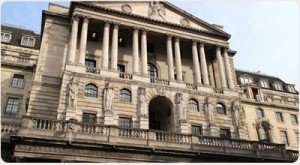West of England business figures have said the Bank of England’s decision to raise interest rates from 0.25% to 0.5% should have little impact on the region – but warned that further increases could hit confidence and slow the economy.
The Bank’s rate-setting monetary policy committee (MPC) voted in favour of the increase by seven to two at its regular monthly meeting last week. 
The increase had been widely expected with commentators claiming markets had already factored it in. However, the pound fell by 0.75% against the dollar to $1.3145 and 1.18% against the euro to €1.265 within minutes of the announcement at midday.
The Bank said it now expected interest rates to rise gradually over the next few years.
Ian Larrard, director of the Swindon & Wiltshire Initiative – part of Business West, the region’s largest business organisation – said: “So while this may be a cautious and timely decision, the question remains: What next?
“The Bank of England points to the fact that inflation has now risen to 3% and there is a need to try and keep it down to its target of 2%.
“However, in a report published earlier this week, there are signs of many businesses in ‘significant’ financial distress – something like 448,000 of them – according to the business recovery specialist Begbies Traynor.
“This rate rise will not be welcomed by these businesses, and there are also concerns that some jitters about the economic situation will affect spending in the shops as we approach Christmas.”
Simon Peacock, South West lead director at property consultancy JLL called the decision a “necessary step” to begin the process of ending the era of cheap credit.
But he added: “Rates may also make it slightly more difficult for first time buyers to get on the ladder as the cost of borrowing increases. It is vitally important that we increase the delivery of new housing in the UK with a wider range of tenures developed, offering not just cheaper entry points to home ownership, but secure, affordable rental options.”
The Bank also said inflation – as measured by the consumer prices index (CPI) – was likely to have peaked at 3.2% in October and would now ease back gradually towards the Bank’s 2% target.
Governor Mark Carney described the interest rate increase as “a modest adjustment” and said, with inflation above 2% and unemployment at its lowest level for more than 40 years, now was the right time to act.
In reaction to the rise, the CBI said the UK bank rate remained “near rock bottom” and pointed out that the increase took it back to its August 2016 level.
Chief economist Rain Newton-Smith added: “Businesses will be watching the reaction of consumers closely and what’s important is the pace of any future rises. As rates creep up, it’ll be important to keep an eye on the impact for those at the lower end of the income scale.”
David Westgate, group chief executive of West of England estate agents and property group Andrews said the decision should have no impact on the property market and was, in his opinion, long overdue.
“In the aftermath of the financial crisis, it made sense that rates should be kept low in order to drive activity in the market,” he said.
“That was, however, 10 years ago and the time is now right to start readdressing rates. Given that this is a relatively small increase in the base rate, its impact to most borrowers should be nominal and, assuming they have planned appropriately, relatively easy to adapt to.
“What the industry needs to ensure, however, is that it works to stem any knock to confidence amongst consumers that this announcement brings. Simply hearing news of a rate increase will lead some people to reconsider their financial and property decisions and whilst this is understandable in some respects, these decisions should only ever be made based on personal circumstances and with at least a medium, if not long, term view.
“When taken in this context, [the] rate increase should not have any impact on the property market.”














